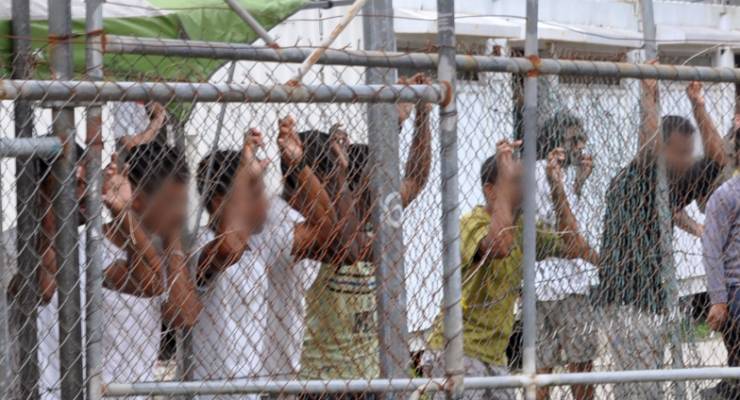
Asylum seekers in Australia’s offshore detention centres are pressed in on all sides. In Nauru, access to justice is slow and tortuous. And, in Papua New Guinea, lawyers acting for those who Australia forcibly removed to Manus Island are hitting roadblocks as they seek to litigate their clients’ cases.
Since striking an agreement in 1976, individuals in criminal and civil cases aggrieved by decisions of Nauru’s courts have been able to access Australia’s High Court. Smarting from the fact that the High Court has, in the past two years, overturned a number of decisions from the Nauru courts (with a common theme being the lack of procedural fairness to asylum seekers), the Nauru government has announced it is terminating the agreement on the pretext that it wants to establish its own appellate court.
Ordinarily, such an intention is laudable but the timing is deeply disturbing given that the impact will be to place asylum seekers at the mercy of the inadequate and capricious Nauruan justice system where political pressure on the courts has led to a number of high-profile resignations by magistrates and judges.
But while Nauru’s cynical manoeuvre is getting an airing in the Australian media, what is happening in PNG has not.
In April 2016, the PNG Supreme Court ruled that over 800 asylum seekers whom the Rudd government forcibly removed to Manus Island in 2013 had been held unlawfully since that time under the PNG constitution. The finding meant that each of those asylum seekers is entitled to damages for every day of unlawful detention. The damages claim for each detainee is likely to be, conservatively, over $80,000. What is also being sought for the Manus detainees are court orders compelling the PNG government to issue travel documents so that these men can go to a safe third country such as New Zealand.
Since signalling this legal action and filing documents with the court last month to pursue justice on behalf of his clients (which include award-winning filmmaker and journalist Behrouz Boochani), lawyer Ben Lomai has been frustrated by technical applications from the PNG government lawyers and difficulties with the Chief Justice of PNG Sir Salamo Injia. Salamo, Lomai says, has a close connection with Foreign Minister Rimbink Pato. Lomai told Radio NZ on March 30, “It’s public knowledge that they are very close to each other.”
On March 25, Lomai’s frustration spilled over in this report he published on his Facebook page where he noted that the matter is coming back to court this Friday, and that he has indicated to the bench he “will be filing two applications to disqualify Sir Salamo Injia and Derrick Hartshorn”:
Their involvement earlier in the cases have been substantial in that both of them have discussed the merits of the asylum seekers’ cases in detail at some point. Their involvement now would seem to suggest some elements of actual or apprehended bias. There’s also some evidence that the Court has allegedly collided with the PNG Government in these cases. I will confirm instructions with a view to file some information crucial evidence.
So what is Australia’s role in all this? It is hard to fathom but consider this fact: it is highly likely that the Australian taxpayers will have to foot the bill, which would be in excess of $100 million if all claims for damages are accepted, because of agreements between the Australian government via the High Commission in Port Moresby, to pay for such claims. This figure does not include the legal fees for Lomai and his team or the fees of the PNG government’s lawyers.
So while Australia, as a newly minted member of the UN Human Rights Council will profess its commitment to the rule of law and access to justice, it will not be urging the PNG government to uphold those values.
Greg Barns is a barrister and has had an advisory role in the PNG Manus detainees litigation. He is a spokesperson for the Australian Lawyers Alliance.








What a godless mess Australia stands fully responsible for? Innocent of ‘charge’. Incarcerated, Open ended term extending into infinity . . . or until mentally destruct. Torture. Withholding of first world health service. Inhumanity.
Whilst knickers are knotted about overpaid, cheating cricketers, let it not be forgotten that 70% of the electorate voted for parties who believe this viciousness is just dunky-hory.
Priorities.